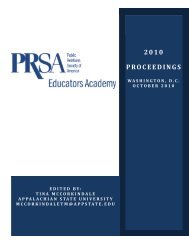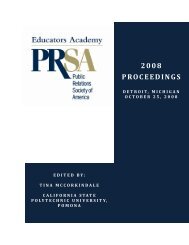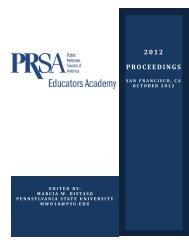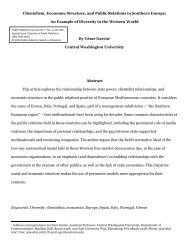2009 PROCEEDINGS - Public Relations Society of America
2009 PROCEEDINGS - Public Relations Society of America
2009 PROCEEDINGS - Public Relations Society of America
You also want an ePaper? Increase the reach of your titles
YUMPU automatically turns print PDFs into web optimized ePapers that Google loves.
RQ 3: To what extent are the types investing information sought associated with<br />
the sources <strong>of</strong> information individual investors prefer?<br />
RQ 4: To what extent are the qualities <strong>of</strong> investing information sought associated<br />
with the sources <strong>of</strong> information individual investors prefer?<br />
From these research questions and the literature, three hypotheses have been<br />
derived for subsequent testing.<br />
H1: The more that individual investors seek details about a company’s products<br />
and management, the more likely they will consider information from a company<br />
to be useful (as opposed to news media and individual sources).<br />
H2: The more that individual investors seek investing information that has a<br />
comprehensive quality, the more <strong>of</strong>ten they will consider information from<br />
corporate information sources to be useful.<br />
It is generally expected that the third-party objectivity <strong>of</strong> the news media would<br />
make them a more preferred source than corporate public relations materials. However, it<br />
is plausible that the angle <strong>of</strong> a news media story may be narrowly focused on one type <strong>of</strong><br />
information and that corporate communications provides more sought-after detail and<br />
other types <strong>of</strong> information. This is likely especially true for investors, for whom a focus<br />
on one particular type <strong>of</strong> content, e.g. financial performance, does not satisfy their<br />
interest in other types <strong>of</strong> information, such as corporate reputation and details about<br />
products and management mentioned above. Previous research has shown that investors<br />
prefer to educate themselves using a variety <strong>of</strong> information (Mezick, 2001), which<br />
specifically suggests H1. Furthermore, recent research has shown that individual<br />
investors behave rationally and seek to exploit private information when buying stock<br />
(Kaniel et al., 2008). Gaining a unique insight to exploit would necessarily require<br />
information more comprehensive than what is commonly available in mainstream and<br />
business news media, and this information is best available from an individual company,<br />
which suggests H2. Neither Mezick nor Kaniel et. al. explored where investors got their<br />
information, which is the contribution <strong>of</strong> this study.<br />
H3: The more <strong>of</strong>ten individual investors seek investing information with the<br />
qualities <strong>of</strong> being objective, credible, timely, easy to access, and brief/relevant,<br />
the more <strong>of</strong>ten they will consider information from a media information source to<br />
be useful.<br />
One form <strong>of</strong> variance among individual investors is their investing strategy or the<br />
degree <strong>of</strong> effort they put into the task. In other words, some investors are more actively<br />
engaged in seeking information, studying opportunities, and making stock purchases than<br />
others. Cameron (1992) tested the situational theory <strong>of</strong> publics—which segments active<br />
and passive publics—in an investor relations context and found that “investors”<br />
(undergraduates were subjects) who were more active and involved subjects processed<br />
information more actively. While Cameron was interested in recall and recognition<br />
42

















